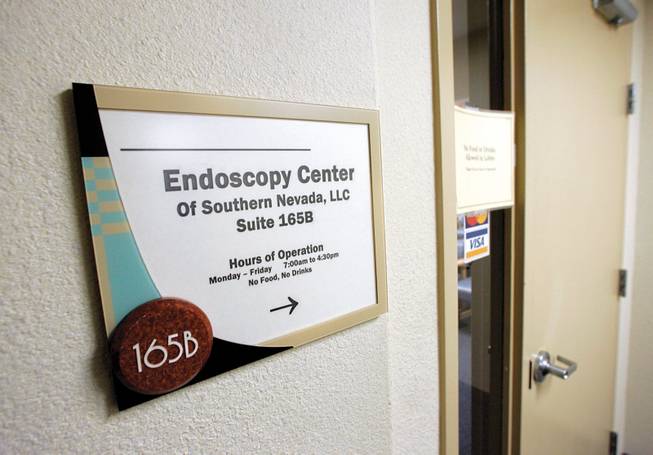
The office of the Endoscopy Center of Southern Nevada, 700 Shadow Lane, is shown Feb. 27, 2008. Investigators traced hepatitis C infections of nine people to procedures conducted in 2007 at clinics such as this one.
Wednesday, April 2, 2008 | 2 a.m.
Sun Topics
The disclosure in February that 40,000 people were at risk of infectious disease because of dangerous injection practices at a Las Vegas endoscopy clinic stunned a community already wary of the quality of health care.
And now comes news from health investigators that the problems were actually worse than originally feared.
Nurses complained at the lab about the dangerous shortcuts being taken at the risk of patients’ health. One nurse quit the same day she started. Colonoscopies were being performed in an unfathomably quick two minutes. And “bite blocks” — devices put in patients’ mouths for some procedures — as well as biopsy forceps that snip tissue were being reused on patients instead of being disposed of after one use.
Those are among the findings of an interim report by the Southern Nevada Health District on practices at the Endoscopy Center of Southern Nevada that triggered a hepatitis C outbreak.
The report suggests the shortcuts used by the staff that endangered patients’ lives — including reusing syringes and drawing from single-dose medicine vials for multiple patients — were well-known among the staff and the source of multiple employee complaints.
On Feb. 27 the Health District announced that people treated at the Endoscopy Center since 2004 needed to be tested for hepatitis B, hepatitis C and HIV because of the unsafe injection practices. Since then the clinic has lost its business license and multiple agencies are investigating Dr. Dipak Desai and other physician-owners for possible criminal behavior, insurance fraud and medical malpractice.
In the weeks since the investigation was announced, some local doctors, including infectious disease specialists, speculated that the reused syringes and medicine vials might not be the primary cause of the hepatitis C outbreak, given details about the unsanitary processing of the scopes used for the procedures. That’s not the case, according to the Health District.
In the newest and most detailed report so far, Dr. Lawrence Sands, chief health officer for the Health District, says several staff members said biopsy equipment labeled for single use was reused for multiple patients after disinfection. Records seem to confirm this: 7,800 biopsies or polyp removals were performed in 2007, but only 6,200 biopsy forceps or polyp removal wires were purchased. The devices cost about $9 each.
The clinic’s staff also told investigators they’d reused bite blocks, which one local gastroenterologist said cost about $2.25 each. The clinic’s purchasing records show it bought only about 2,000 bite blocks in 2007, Sands said, when about 5,800 upper endoscopy procedures, which call for use of the blocks, were performed there. One staff member said they were allowed to use only four bite blocks per day in each of the two procedure rooms, regardless of how many procedures were performed, Sands wrote.
The report caused other doctors in town to cringe. Gastroenterologist Dr. Frank Nemec said he’s “totally disgusted” by the latest revelations about the clinic.
“This whole thing has just been horrible for us,” Nemec said. “Our patients are totally dispirited and untrusting. I just think that this all centers around taking too many shortcuts, cutting too many corners.”
Dr. Jim Christensen, a Las Vegas allergist who sits on the Health District’s board, said reusing bite blocks is not high-risk, but that it could pass along hepatitis B, hepatitis C and HIV.
“The mouth is not a clean place,” he said.
Sands wrote that the practice would not pose a “significant risk” to patients.
The endoscope sterilization process was not believed to be the cause of the patient infections, Sands wrote, because reviews of the logs for the machine that sterilized the equipment showed no problems for the days before and after the two dates when patients picked up hepatitis C at the clinic.
The report elaborated on previously released reports in which nurses said they’d been told by their supervisors to reuse syringes. One nurse said a specific doctor — Sands did not say which physician — had directed the staff to reuse syringes and other equipment, and the nurse said he had complained to another doctor, a supervisor and an administrator about the practice, Sands said.
Other current staff members said they’d been directed to reuse syringes, but they were unwilling to tell investigators who had given them the order, Sands said.
Another staff member told Health District investigators she had complained to a supervisor and quit after one day because of equipment reuse and being told to document that a doctor had seen a patient when he had not. The woman said she had complained to other staff members and was told it was “how things were done” at the clinic, Sands wrote.
On Sept. 21, 2007 — one of the dates on which hepatitis C was passed to patients — one colonoscopy lasted only two minutes and another only three minutes, Sands reported. Nemec, the gastroenterologist, said such rapid procedures are not adequate to search for polyps and colon cancer.
According to procedure times on patient charts for the same day, on four occasions an individual doctor was performing more than one procedure at the same time, Sands wrote.
And multiple staff members told investigators that anesthesia times had been incorrectly reported to allow for additional billing. This could be insurance fraud and is the subject of an investigation by the Nevada attorney general’s office and the FBI.

Join the Discussion:
Check this out for a full explanation of our conversion to the LiveFyre commenting system and instructions on how to sign up for an account.
Full comments policy